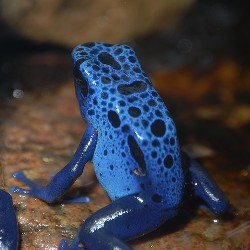 Take a look at this recent National Geographic photo of a researcher licking one of her beloved research subjects. We’ll just have to hope neither she nor her lab research equipment is carrying the Chytrid Fungus that’s wiping out the world’s amphibians.
Take a look at this recent National Geographic photo of a researcher licking one of her beloved research subjects. We’ll just have to hope neither she nor her lab research equipment is carrying the Chytrid Fungus that’s wiping out the world’s amphibians.
After watching that video on MSN I was curious if other National Geographic videos were similarly “entertainment oriented.” The next clip (preceded by a commercial) was about some tourist in Thailand purportedly pulling a monster fish out of a lake. It isn’t a lake. It’s a 9-acre pond stocked with fish for tourists to catch. The lodge owner appears to let tourists catch this particular giant fish over and over again. They have even designed a net that won’t kill it (past experience, I’m sure).
The narration in these clips appears to be aimed at the lowest common denominator, possibly kindergarteners.
“Kieth worries. The longer the air breathing fish[?] stays under, the greater its danger of suffocation … the exhausted angler finally gets the fish to shore … gauges that it is larger than any caught on record [my ass].”
On the heels of that clip is another where an excited and well-meaning researcher catches a Great White. He hacks a chunk off its tail before letting the oxygen starved animal sink to the bottom, apparently with a hook still embedded in its mouth and rope still dangling on the end.
Unlike most fish, sharks pump oxygen through their gills by constantly moving forward. Force a shark to hold still and it will suffocate. When medics arrive on a scene their first priority is to make sure oxygen is flowing to the brain. Oxygen deprivation destroys cells, particularly brain cells — starve a brain of oxygen too long and it will be permanently damaged. I wonder what level of oxygen deprivation damage that shark sustained as a result of its encounter with the researcher.
The last time I posted an article critical of researchers (particularly their tendency to dart anything that moves), I caught hell from an irate big cat biologist sitting atop his high horse. By the way, a study recently published in the Journal of Mammalogy suggests that darting may have greater ramifications than realized.
I am not of course advocating an end to research. I would advocate that biologists around the world consider adopting an oath similar to the Hippocratic oath taken by physicians.

